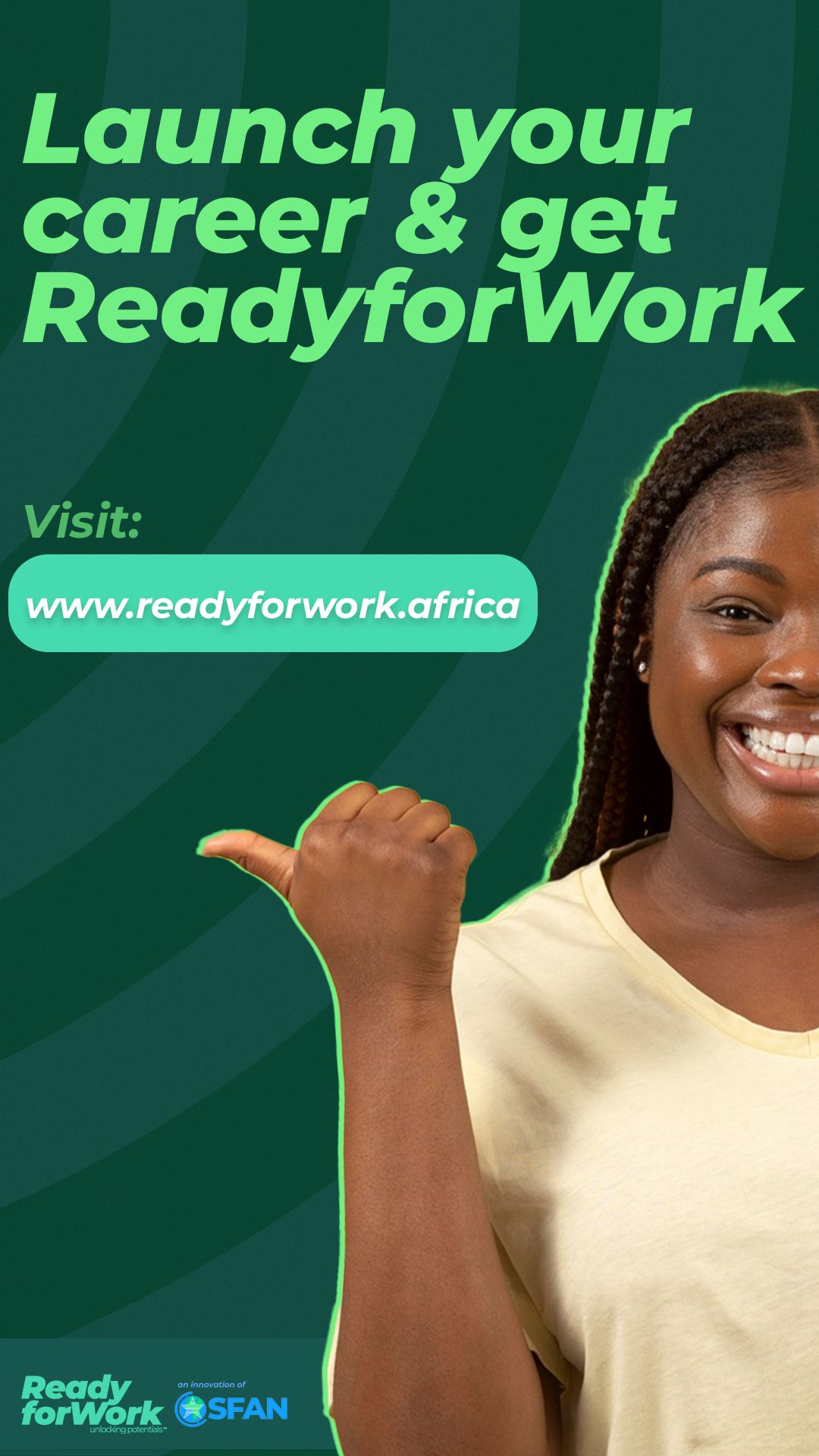Mastering the Art of Job Search: Insider Insights for Finding and Landing Your Dream Career
by SFAN Staff · Career advice
Wed, 30 Aug 2017 · 3 minute read

Almost every student or job seeker has a fair idea of what career they want to pursue but many don’t know how to make it h
appen. Job search is becoming increasingly difficult and thanks to technology, employers are continually raising the bar on their expectations from new hires.
So, how do you beat the odds and nail that job that puts springs on your feet each morning as you go to work?
We invited an Executive Trainer and an HR Director to the September edition of #SFANLiveChat to weigh in on how job seekers can prepare for and find careers they love — or let it find them.
Take a peek at a recap of the previous SFAN edition
Marricke Gane Kofi is a Donor Consultant/Executive Trainer at Marricke Gane Consulting Ltd while Lexy Boahene is the founder of LX HR Solutions, an HR company that helps Ghanaians in Diaspora find work back home. Below are exclusive insights from the chat — on how to determine your career path, stay visible to recruiters, and eventually get hired.
1. Understand What a Career is And be Clear About What You Want
There’s a difference between having a job and having a career. A job is something you get to do to make a living — to earn money — while a career is like a calling. “In my view, a career is something you are wired for, love doing, and that adds value to you and others both financially and otherwise,” Marricke explains.

In a job, you do whatever the boss says and try as much as possible to be in his good books but in a career, you go above and beyond your job description. Your primary focus is not on doing the barest minimum to earn a paycheck, you take initiative and perform the job as though the company belongs to you.
“I’d describe it as an occupation that you embark on throughout your working years,” Lexy underscores. “You are expected to develop and progress through this journey!”
This involves a clear understanding of what you truly want and setting specific goals on how to actualize it.
“I don’t think you always necessarily know from the beginning,” Lexy says, “but it’s important to consider these three things when choosing a career path:
- Make sure you are doing what you love or enjoy
- Do what you are good at and what naturally comes easy
- Try to stick to broad subjects/tasks in the beginning. Learn a range of new things and transferable skills.”
Marricke observes: I think one of the core things to do is to know yourself -- how your brain works, your personality, your natural interests. The moment you know how you are wired, the next thing is to figure what industry and roles require your strength most. Your strengths must find you your career, not vice versa.
When you’ve figured out where to start your career journey, then you need to set clear goals for your progression:
- Where do you want to be in the next year, five years, or ten years and how do you get there?
- What needs to be done daily, weekly, or monthly to move you further, and faster?
Note! Things might not always play out the way you planned, continually review your strategy and adapt to changes.
Finally, leverage community events, attend workshops, find a mentor, and build relationships. These will help you find direction.
2. Don’t be Trapped by the Lack of Experience “Catch 22”
“It’s better to be prepared for an opportunity and not have one than to have an opportunity and not be prepared.” — Whitney M. Young
Recruiters won’t hire you if you don’t have work experience. But you need the job to get work experience. That’s the catch-22 entry-level job seekers often face.

To avoid this, don’t wait until you graduate from college before getting prepared for work, get involved in an internship or apprenticeship scheme -- work for free if you have to or find a solution to a problem and create a startup, Lexy emphasizes.
Your internship job might not necessarily be in the area of your passion but it gives you an invaluable understanding of the world of work and helps you create vital connections. An internship is a way of testing the waters of your career journey.
Many students often moan that they don’t get to do actual work during an internship other than ‘fetching coffee or making copies’. The truth is that if you’re diligent in those humble assignments, you could build great traction that might land you better roles.
No matter how insignificant your work might seem, be sure to use it as an opportunity to distinguish yourself and learn how things work in the bigger context. Ask questions, show genuine interest in what your colleagues are doing, and someday someone might need a hand with something and you’d be ready.
3. Make it Hard for Recruiters to Ignore Your Resume.
“When you do a resume, think of a recruiter as looking at thousands of resumes, she or he will pick ones that make her or his work easier to select.” — Marricke Gane

Contrary to popular opinion, many hiring managers are still utilizing resumes in making recruitment decisions.
But, that’s not the whole truth.
Let’s say you saw a job advert and sent in your resume. The system stacks it in and eventually, the HR exec gets ready to review the pile (if she doesn’t review them, just in time).
She is looking for two exceptional candidates for a marketing position but she’s faced with more than 2,000 resumes (well, to be fair let’s just say 100 resumes). As if that’s not enough, she has to also take a peek at some of the cover letters for the shortlists.
How much time do you think she has to consider each of the resumes before clicking the “next” button or throwing it into the waste bin?
15 seconds, tops!
So how do you make your resume stand out from the pack?
“Make it look the way most people’s resume will NOT look like; simple, easy to digest, and powerful. I like to use infographics. I recommend infographics because most won’t use them. It depicts info on you in attractive and digestible ways,” Marricke says.
Many job applicants often think that the more content and “activities” they have on their resume, the better. And so they list everything you can imagine in there. Unfortunately, that’s the quickest way to get your copy into the trash bin.
A better approach is to find out what experiences the job needs and highlight that.
“Keep it simple and please make sure the layout is not overwhelming,” Lexy cautions.
The difference between a CV and a Resume:
It is generally accepted that a CV (Curriculum Vitae) is a long in-depth document that can be laid out over two or more pages and it contains a high level of detail about your achievements, a great deal more than just a career biography while a resume is a concise document typically not longer than one page as the intended reader will not dwell on your document for very long. The goal of a resume is to make an individual stand out from the competition.

P.S. Remember to spellcheck your stuff, use uniform fonts and sizes, and highlight your accomplishments in every role you mention.
4. Brand Yourself on Social Media
Social media is a very useful resource when you’re looking for a job but it can equally be a liability.
“If you haven’t kept a good social presence until now, it’s a bit late because recruiters go way back to look. Most recruiters just want to see if you are positive or negative in the social space. So be on social media to make an impact. You can’t be nasty on social media and tell interviewers you are sweet — they’ll see you as a reputational time bomb,” Marricke explains.
To create a good social media image, Lexy says, firstly, have a presence on social media even if it’s just Linkedin and be active! Talk about social issues and highlight your strengths on your social media pages.
In today’s super competitive labor market, personal branding trumps “job experience”. Leverage social media to create your equity and become a thought leader in the area of your passion. A lot of companies are looking for subject matter experts and social media influencers because the majority of business transactions now happen via social media.
Here’s a simple outline of how to create a personal brand on social media:
- Identify two to three subjects you care about -- you have to represent something.
- Create a decent and consistent profile across various platforms -- Guy Kawasaki, the chief evangelist of Canva says the rule of thumb is to always have a professional business attire photo of just your face for profile pictures.
- Start blogging or posting consistently on subjects of your choice. Don’t just focus on sharing your stuff, make time to connect with others by reading, sharing, commenting on, or liking their posts/tweets.
- Be authentic. The reason you have to be you is that if you are simply putting on a show, the day the façade comes down, you’ll lose your audience.
How SFAN Integrates Africa's Youth Into the Global Workforce
SFAN established the transformational ReadyforWork accelerator to unlock the potential of Africa's budding talents and help them become part of the global workforce.

Unveiling ReadyforWork
For entry-level job seekers and early career professionals who need tools, services, and support to learn new digital skills to launch or future-proof their careers, ReadyforWork offers an Al-assisted education solution with a market-aligned curriculum, clear career path and tools to prove their skills to prospective employers.
The platform is a two-sided marketplace. It helps learners understand how they stack up against their competition, gives them resources to level up and become of higher value when looking for gainful and meaningful work, and gives employers access to an emerging talent pipeline for a global workforce --with data-driven mechanisms to assess that talent.
Unlike other training programs that major in providing certifications, which do not work, ReadyforWork focuses on deep education, making learners minimally viable for their career aspirations. Through project-based, industry-driven training models and coach support, ReadyforWork gives students tools to turn learned skills into businesses and fulfilling careers.
How ReadyforWork Works
ReadyforWork leverages strategic partnerships with employers and entrepreneurs in high-growth industries to help learners experience a market-aligned curriculum and create successful careers.
Our success-based pricing means learners can enjoy high-value, data-driven education at less than 30% of the cost of traditional programs. Whether you're looking for a new job, want to upskill to future-proof your career, or turn your passion into a business, ReadyforWork provides personalized, project-based learning, 1:1 career coaching, and career pipelines that help participants unlock their potential.
Unique Benefits With Transformational Results
ReadyforWork sets itself apart from the competition because of its intense focus on deep education with project-based programming. Some unique benefits include:
- Market-Aligned Curriculum: A market-aligned curriculum means students learn from industry practitioners and not individuals who never practiced what they're teaching in real life.
- Project-Based Learning: The project-based learning framework allows learners to solve real business problems for real companies, not made-up case studies with zero accountability.
- Personalized Education: Personalized education helps learners access tailored materials that meet their career needs where they are and track their progress with actual data.
- Ongoing Career Support: With the community support and job pipeline, ReadyforWork learners get the tools, services, and support systems they need to turbocharge their careers.
Every candidate who graduates from our program can be sure they are ReadyforWork! Watch Prince's testimonial:
Join thousands of young Africans launching their careers.
Get free career and entrepreneurship tips delivered directly to your inbox.

